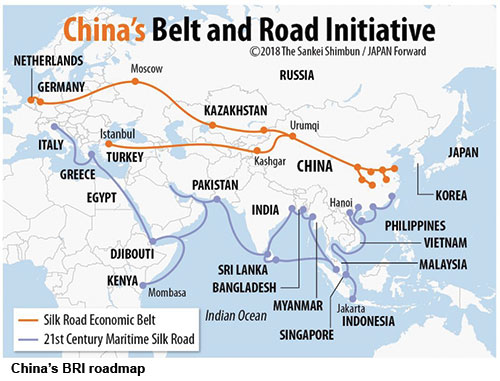
Image Source: educationworld
The Belt and Road Initiative (BRI), launched by China in 2013, is one of the largest infrastructure and development projects in history. As the BRI completes its first decade, it is essential to evaluate its impact and consequences, particularly from the UPSC perspective. This article delves into the hits and misses of the BRI, analyzing its implications on a global scale.
Overview of the Belt and Road Initiative
The BRI aims to enhance connectivity and cooperation between Asia, Europe, Africa, and beyond through the development of infrastructure projects, trade, and economic partnerships. it comprises a network of roads, railways, ports, and other infrastructure investments spanning over 140 countries.
This ambitious initiative seeks to revive historic trade routes and promote economic growth, primarily benefiting developing countries and emerging markets.
Hits: Positive Outcomes of the BRI
The BRI has achieved several positive outcomes, including:
- Infrastructure Development: The initiative has facilitated the construction of crucial infrastructure projects, such as ports, highways, railways, and power plants, which have improved connectivity and boosted economic growth in participating countries.
- Trade Enhancement: By connecting various regions, the BRI has facilitated increased trade and economic integration. It has opened up new markets for participating countries, leading to a surge in trade volumes.
- Foreign Direct Investment (FDI) Inflows: The BRI has attracted substantial amounts of foreign direct investment, which has stimulated economic development in participating nations.
- Improvement of Geopolitical Relations: By fostering economic partnerships, the BRI has enhanced geopolitical ties between China and participating countries, creating mutually beneficial relationships.
Misses: Concerns and Challenges
However, the BRI has also faced several criticisms and challenges:
- Debt Burden: Critics argue that some participating nations have fallen into a debt trap due to unsustainable financial investments. This has raised concerns over the long-term economic viability and sovereignty of these countries.
- Lack of Transparency: The BRI is criticized for its lack of transparency, particularly regarding project details financing terms, and environmental standards. This opacity raises questions about the nature of these investments and their-term consequences.
- Environmental Impact: The rapid pace of infrastructure development associated with the BRI has raised concerns about its impact on the environment. Critics argue that insufficient environmental assessments and unsustainable practices could lead to ecological degradation.
- Geopolitical Rivalries: The BRI has sparked geopolitical tensions, particularly in regions with competing interests. It has caused concerns over Chinese influence and potential strategic encirclement, leading to a competitive pushback from other countries.
UPSC Perspective: Importance of Understanding the BRI
From a UPSC perspective, understanding the BRI is crucial due to its geopolitical and economic implications:
- International Relations: The BRI's impact on international relations and the changing global order is an important topic for UPSC aspirants to comprehend. It requires analyzing the interests and strategies of various countries.
- Economic Development: Evaluating the economic impact of the BRI and its implications for participating nations is paramount for understanding in-depth economic scenarios and challenges faced by different regions.
- Geopolitical Challenges: The BRI has generated geopolitical challenges and opportunities. Analyzing the complexities of these challenges and their implications will contribute to a well-rounded understanding of global affairs.
- Sustainability Concerns: The BRI’s environmental implications and sustainability concerns are imperative to address from the UPSC perspective. Candidates should understand the importance of considering ecological factors in development projects.
In conclusion, the Belt and Road Initiative has experienced both hits and misses in its first decade. While it has achieved significant infrastructure development and enhanced international trade, it also faces challenges related to debt burdens, lack of transparency, environmental impact, and geopolitical rivalries. Understanding the BRI is essential for UPSC aspirants, as it sheds light on crucial aspects of international relations, economics, geopolitics, and sustainability.